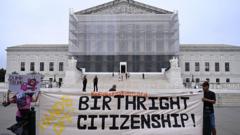Will the Supreme Court Uphold Trump's Birthright Citizenship Ban?

Published: 2025-09-27 18:30:50 | Category: technology
The Trump administration is currently seeking to have the Supreme Court uphold its executive order that aims to end birthright citizenship in the United States. This order, signed by President Trump on his first day back in office in January, seeks to deny citizenship to children born in the US to parents who are in the country illegally or on temporary visas. The order has faced legal challenges, being blocked by lower courts which argue it is unconstitutional. The Justice Department has filed an appeal, asserting the decision undermines border security and rewards unqualified individuals with citizenship.
Last updated: 06 October 2023 (BST)
Key Takeaways
- The Trump administration's executive order targets birthright citizenship.
- Lower courts have blocked the order, citing constitutional concerns.
- The Supreme Court's involvement is anticipated to resolve ongoing legal disputes.
- Pew Research shows a significant number of children born to unauthorised immigrant parents.
- The potential implications of the order could increase unauthorised immigration figures by 2050.
Understanding Birthright Citizenship
Birthright citizenship is a legal right whereby any child born within a country’s territory automatically acquires citizenship of that country. In the United States, this principle is enshrined in the 14th Amendment of the Constitution, which states that all persons born or naturalised in the US, and subject to its jurisdiction, are citizens. This has traditionally included children born to unauthorised immigrants.
The Executive Order and Its Implications
President Trump's executive order seeks to reinterpret the 14th Amendment's clause "subject to the jurisdiction thereof." The administration contends that this clause excludes children born to parents who are not legally in the country. Critics argue this interpretation violates the core principle that anyone born in the US is a citizen. The ongoing legal battle reflects broader tensions surrounding immigration policy in the United States.
Legal Challenges and Court Rulings
Following the signing of the executive order, multiple lawsuits were filed against it, asserting that the order was unconstitutional. Judges in various jurisdictions, including Maryland, Massachusetts, and Washington state, issued nationwide injunctions, halting the order's implementation. These judicial decisions highlight a significant pushback against the administration's immigration policies.
The Supreme Court's Role
In June, the Supreme Court ruled that a federal judge cannot block a presidential order, yet it allowed for judicial blocks to remain in place for individuals suing against such orders. This creates a complex legal landscape where the fate of the executive order hangs in the balance. The Justice Department's recent appeal aims to have the Supreme Court definitively resolve these issues in its new term starting on 6 October.
The Impact of Ending Birthright Citizenship
According to research from Pew, there were approximately 250,000 babies born to unauthorised immigrant parents in 2016, a significant decline from previous years. By 2022, the number of US citizens born to unauthorised immigrants rose to 1.2 million. The Migration Policy Institute suggests that if birthright citizenship is abolished, the number of unauthorised immigrants could surge to 4.7 million by 2050 due to generational effects.
Public Opinions and Statements
In public discussions, President Trump has expressed his belief that children of unauthorised immigrants should be deported alongside their parents, raising significant ethical and legal questions. His stance indicates a hardline approach to immigration that prioritises policy enforcement over humanitarian concerns. This polarising viewpoint continues to fuel debates on immigration reform across the nation.
The Broader Context of Immigration Policy
The discussion surrounding birthright citizenship is part of a larger narrative on immigration policy in the United States. The Trump administration has consistently advocated for stricter immigration controls, reflecting a significant shift in the country's approach to immigration. As legal battles continue, the implications of these policies will likely resonate throughout various sectors, including social services, education, and public health.
What Happens Next?
As the Supreme Court prepares to hear the administration's appeal, the outcome could set a significant precedent regarding citizenship and immigration laws. Legal experts anticipate that this case will not only impact current immigration policy but also shape future discussions about citizenship rights in the United States.
FAQs
What is birthright citizenship?
Birthright citizenship refers to the automatic acquisition of citizenship for any child born within a country's territory, as guaranteed by the 14th Amendment in the US.
What does the Trump administration's executive order aim to change?
The executive order intends to deny citizenship to children born in the US to parents who are in the country illegally or on temporary visas, challenging long-standing interpretations of the 14th Amendment.
Why have lower courts blocked the executive order?
Lower courts have blocked the executive order on the grounds that it is unconstitutional, arguing that it violates the rights granted under the 14th Amendment.
What are the potential consequences of ending birthright citizenship?
Ending birthright citizenship could significantly increase the number of unauthorised immigrants in the US, potentially affecting millions of individuals and families in the future.
When is the Supreme Court expected to make a decision on this matter?
The Supreme Court is set to hear the appeal during its new term, which begins on 6 October 2023, though the timeline for a decision may vary.
The developments surrounding birthright citizenship and immigration policy continue to evolve. As the Supreme Court prepares to address these critical issues, the implications will resonate across various sectors of society, influencing the lives of millions. How will these changes shape the future of citizenship in the United States? #BirthrightCitizenship #USImmigration #SupremeCourt



